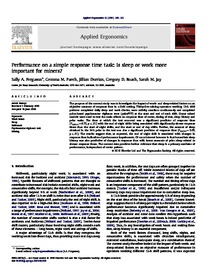Performance on a simple response time task: is sleep or work more important for miners?

Ferguson, Sally A. ; Paech, Gemma M. ; Dorrian, Jillian ; Roach, Gregory D. ; Jay, Sarah M.
2011
42
2
210-213
miner ; performance appraisal ; shift work ; sleep ; vigilance tasks ; working time
Working time and leave
English
Bibliogr.
"The purpose of the current study was to investigate the impact of work- and sleep-related factors on an objective measure of response time in a field setting. Thirty-five mining operators working 12-h shift patterns completed daily sleep and work diaries, wore activity monitors continuously and completed palm-based psychomotor vigilance tests (palmPVT) at the start and end of each shift. Linear mixed models were used to test the main effects on response time of roster, timing of test, sleep history and prior wake. The time at which the test occurred was a significant predictor of response time (F3,403.4 = 6.72, p < .01) with the end of night shifts being associated with significantly slower response times than the start of night shifts, and the start or end of day shifts. Further, the amount of sleep obtained in the 24 h prior to the test was also a significant predictor of response time (F3,407.0 = 3.05, p < .01). The results suggest that, as expected, the end of night shift is associated with changes in response time indicative of performance impairments. Of more interest however is that immediate sleep history was also predictive of changes in response time with lower amounts of prior sleep related to slower response times. The current data provides further evidence that sleep is a primary mediator of performance, independent of roster pattern."
Digital
The ETUI is co-funded by the European Union. Views and opinions expressed are however those of the author(s) only and do not necessarily reflect those of the European Union or the ETUI.